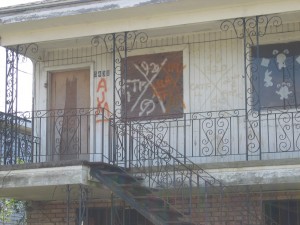 Over the almost seven years since Hurricane Katrina came ashore, I’ve read quite a few books about the experience. Some have been non-fiction; some have explored the event through fiction. (Non-fiction: The Great Deluge by Douglas Brinkley; Nine Lives by Dan Baum; Why New Orleans Matters by Tom Piazza. Fiction: City of Refuge by Tom Piazza; Claire DeWitt and the City of the Dead by Sara Gran; The Tin Roof Blowdown by James Lee Burke.) All have added to my understanding of the event and of New Orleans, as did the experience of spending a week in New Orleans helping with rebuilding efforts. I’ve recently added two more titles to this list: Zeitoun by Dave Eggers (non-fiction) and Salvage the Bones by Jesmyn Ward (fiction).
Over the almost seven years since Hurricane Katrina came ashore, I’ve read quite a few books about the experience. Some have been non-fiction; some have explored the event through fiction. (Non-fiction: The Great Deluge by Douglas Brinkley; Nine Lives by Dan Baum; Why New Orleans Matters by Tom Piazza. Fiction: City of Refuge by Tom Piazza; Claire DeWitt and the City of the Dead by Sara Gran; The Tin Roof Blowdown by James Lee Burke.) All have added to my understanding of the event and of New Orleans, as did the experience of spending a week in New Orleans helping with rebuilding efforts. I’ve recently added two more titles to this list: Zeitoun by Dave Eggers (non-fiction) and Salvage the Bones by Jesmyn Ward (fiction).
Salvage the Bones, a National Book Award winner, is the only book I’ve read about Katrina set outside of New Orleans. It takes place in rural Mississippi, and begins twelve days before Katrina makes landfall. The protagonist, Esch, is fifteen, motherless, poor, pregnant, has an alcoholic father, and several brothers, including one who raises pit bulls for dog fights. (She’s also fascinated by Greek mythology.) Could things get any worse? Why, yes, yes it could. A major hurricane could take direct aim at her home. I can’t say that I enjoyed reading this book–in fact, I found it quite difficult to read, but I couldn’t put it down. It was difficult to read because of the dog fights and several other vividly described gory incidents; however, the writing and the plot were compelling.
In addition to the violence and gore in this book, I felt that there was a disconnect between the language used in direct dialog (non-standard grammar and dialect) by Esch and her internal narrative, which was grammatically correct, literary, and filled with metaphor. I think our spoken words and the words in our heads are much more similar than this.
Zeitoun, set in New Orleans, was also a disturbing book. It recounts the story of Zeitoun, a Syrian American, who was living in New Orleans with his wife and children and owned a painting and contracting business as well as some rental properties. He sent his family to Baton Rouge, but he stayed in New Orleans to keep an eye on their property and business. After the storm, he paddled around the area in his canoe, helping to rescue people and feeding dogs that had been left behind. And then…he’s arrested for something he didn’t do and is imprisoned for weeks and isn’t allowed to contact anyone. His family begins to believe that he is dead. Things continue to go wrong, with miscommunication and bureaucratic foul-ups compounded by racism, abuse of power, and frightened people who didn’t know what they were doing. This book was published in 2009, and things continue to go wrong for this family. Zeitoun was charged earlier this year in a domestic violence incident.
These are both hard books to read, but necessary. No one book can give a complete picture of the impact of Katrina–we need to hear many voices and many perspectives to record this devastating event.